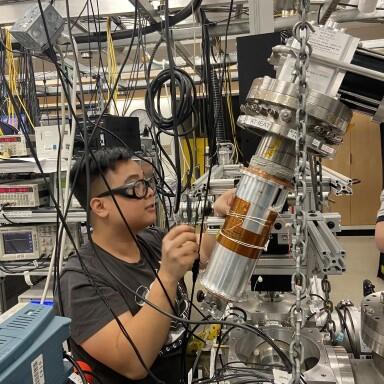
The National Science Foundation awarded Thien Khuu ’23 Ph.D. a Mathematical and Physical Sciences (MPS) Ascending Postdoctoral Research Fellowship, to commence Aug. 1 in Jahan Dawlaty’s lab at the University of California (USC).
The program aims to broaden the participation of historically underrepresented people in the MPS fields by supporting those individuals at the beginning of their careers. The fellowship recognizes postdoctoral fellows whose research has the potential for significant impact and provides them with research and collaborative experiences.
“Not only will the fellowship improve my quality of life in L.A., one of the most expensive cities in the U.S., but it also gives me the freedom to perform independent research, which is important for my growth,” said Khuu, a physical chemist and recent graduate from the Johnson Lab. “There is funding for travel, materials, and fringe benefits that will enable my professional development, reduce research limitations, and ease personal constraints. With those obstacles out of the way, I can focus on my work as well as on meaningful outreach activities.”
The big picture of Khuu’s research pertains to capturing the migration of a proton through a water network, which is the key mechanism for photosynthesis, fuel cells, mammalian vision, and other important reactions that involve charge transfer.
For his Ph.D. thesis, he explored water-mediated proton transfer using 4-aminobenzoic acid (4ABA) as a model system. Equipped with a custom-built spectrometer coupled to multiple lasers, he was able to study 4ABA in the gas phase under controlled conditions.
Specifically, he hydrated the 4ABA cation one water molecule at a time, selected each cluster size (e.g., H+4ABA∙(H2O)n, wih n = 1-6), and cooled the ion ensemble to a specific temperature from 4-300 K. Using a pump-probe method, he has determined that water-mediated proton transfer across the acid scaffold from the amino to the carboxylic site starts at n = 3 at 120 K. His findings are currently under review.
“Thien’s capture of water-mediated proton migration at the molecule level, where each atom in each molecule counts, is a remarkable achievement,” said Mark Johnson, Arthur T. Kemp Professor of Chemistry. “All the more so because he led this team effort through all the challenges presented by COVID-19 with intense focus mixed with excellent humor.”
In the Dawlaty Lab at USC, Khuu will be using this fellowship to study accelerated reactions in microdroplets – a new and popular topic in the science community.
“Microdroplets – ranging from a few microns to tens of microns – have been explored as a ‘new’ reaction medium in the last few years,” said Khuu. “Many chemists have reported that chemical reactions occur 10-10,000 times faster in microdroplets than in bulk solution at ambient conditions without using expensive catalysts. There is potential here to transform how we currently manufacture chemicals, making the process more efficient, cheaper, and greener.”
“This NSF award will propel him to the next level,” said Johnson. “If anybody can figure out the puzzle of microdroplet reaction acceleration, it’s Thien Khuu.”
Physical chemists seek to understand how things work at the atomic level, where one must deal with the quantum-mechanical reality of nature. They extract the essential physics responsible for bulk (observable) chemical behavior and develop simple pictures that everyone can use.
Learn more about physical chemistry at Yale and in the Johnson Lab.